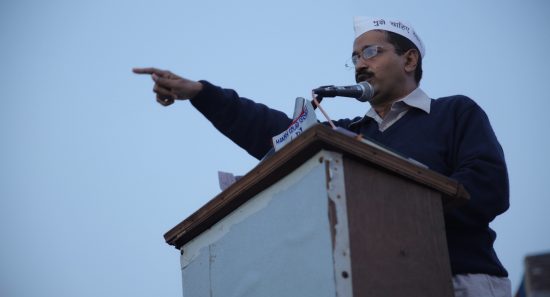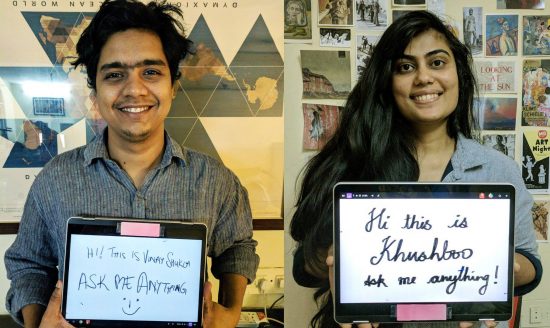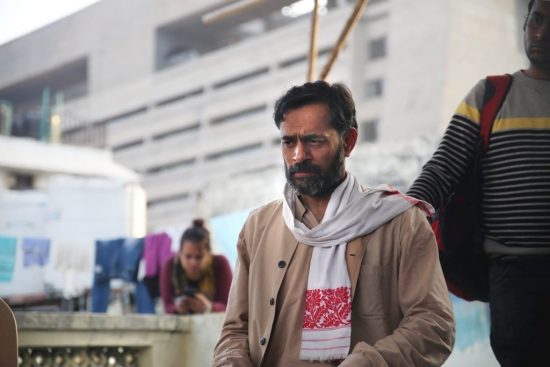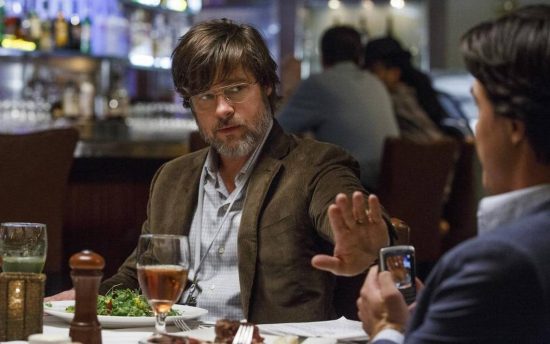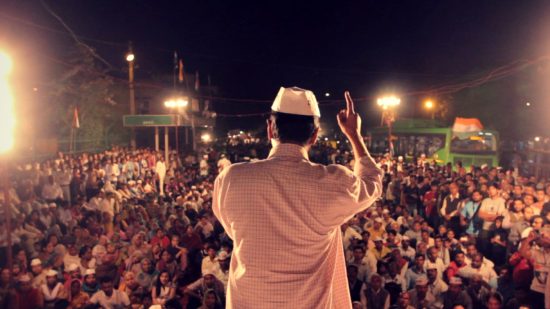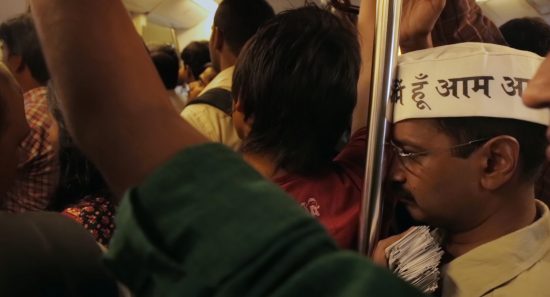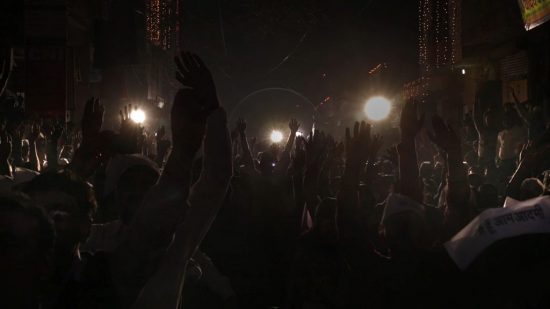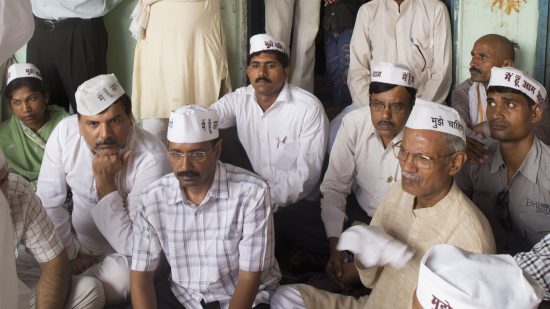Significant Insight: The Making of An Insignificant Man
Trevor Hogg talks to Khushboo Ranka and Vinay Shukla about the creative and political odyssey encountered producing their feature length documentary A Insignificant Man…
In the past Indian films have struggled to compete for international funding but with the financial and mentorship support of the Sundance Institute rookie documentarians Khushboo Ranka and Vinay Shukla were able to complete An Insignificant Man (2016) which chronicles the election of Arvind Kejriwal and his Common Man’s Party (Aam Aadmi Party) in 2013. “For us, An Insignificant Man was as much about learning what being a filmmaker means as stepping up and becoming one,” notes Ranka while promoting what became the largest crowdfunding campaign for a film in India alongside co-director and co-producer Shukla. “It’s our first feature film. We did a lot of the producing and raising of money. It’s an independent production that received support from the Sundance Documentary Fund.”
A prevailing element among the 800 financial backers was a curiosity about the Indian political process revolving around questions such as what does it take to challenge the status quo? Can you do it? What does it mean when idealism takes on politics? How much of a compromise is there? Is that a realistic struggle? Shukla believes, “There is a traditional media that does its job; however, people want more opinions and voices contributing to the topic.” Neither Shukla or Ranka have a political background. “India is so full of stories and we’re interested in films,” states Ranka. “There is a vacuum in terms of the type of stories being told. What was exciting about An Insignificant Man was capturing these characters who are breaking so many stereotypes. You have them talking about sophisticated ideas, like decentralization of democracy, participatory democracy, transparency and how these things affect the mechanisms of how people interact with their own representative. To see them thinking on their feet and making philosophical choices in a messy and chaotic way; that’s how politics is.”
The War Room (1993) which follows 1992 presidential campaign of Bill Clinton is a favourite of Shukla and Ranka but not a direct influence. “There is so much to learn within the genre of political documentaries,” notes Ranka. “We were more inspired by fictional films that are shot like documentaries.” A biographical drama-comedy stands out to Shukla directed by Adam McKay about the subprime home loan crisis that occurred in 2007. “We saw this fantastic film called The Big Short (2015). It’s about Wall Street and the banks. That film is shot within the language of documentaries. It’s handheld. People look into the camera and start talking. It’s interesting how a lot of fiction films employ the language of documentary to give them more authenticity. It has become a language within itself, hyperreal fiction filmmaking. We borrowed from that in terms of our own editing choices and the decision not to have interviews and voiceovers.”
Propelling the narrative is the turbulent protégé and mentor relationship between Arvind Kejriwal and Yogendra Yadav. “As filmmakers you’re always attracted to characters and people who drive the story and the things around them,” states Shukla. “While shooting we quickly realized that these were the two people who speak to the camera and us the most. There is a young political activist, Arvind Kejriwal, and an older psephologist [a person who studies and scientifically analyzes elections], Yogendra Yadav. Yogendra has also tried to be a politician in the past but has failed; he has the wisdom and knowledge of how the system works but not the charisma that Arvind has. Their relationship is extremely exciting because Arvind and Yogendra are almost polar opposites in how they chose to confront challenges, look at the future, and strategize but yet make such a good team.”
The Indian National Congress and Bharatiya Janata Party were also approached to be part of the project. “We didn’t even manage to get past the gatekeepers,” reveals Ranka. “At that time, we were thinking of making a film about all three parties called Election Day; however, access is difficult in India because people are suspicious of cameras.” Hardly any media attention was being paid to the newly formed Aam Aadmi Party. “They didn’t have any cameras around in the beginning.” The camera of choice was the Canon 5D. “The two of us started shooting and another friend of ours [Vinay Rohira] joined us in Delhi,” remarks Shukla. “It was the three of us running around Delhi with this political party that was expanding all over the place. We had to be at 30 different places at the same time doing the camera and sound. We couldn’t have too much equipment in the room, otherwise, we could get thrown out as people get uncomfortable. We used extremely frugal methods. There were no jibs and stabilizers. It was one of us holding the camera, the other one positioning a microphone slightly to the corner and trying to be as invisible as possible.”
400 hours of footage were culled to a 96-minute theatrical runtime. “There was a lot more going on,” notes Ranka. “We eliminated several characters who were not crucial to the story.” No archival imagery was utilized. “We focused on being as close to our characters as possible and wanted people to feel what it likes to be in the room with these guys continuously,” remarks Shukla. “We insisted on using as much production sound as possible to keep it as close to where we were when we were experiencing these events. Our sound designer was P.M. Satheesh. Skywalker Labs saw the film, opened up their production facility and said, ‘Do whatever you want. We have to be associated with the project.’ They were extremely kind and generous. The final sound design was done by three-time Academy Award nominee Tom Myers who brought a lot of the elements together.” Norwegian composer Ola Fløttum scored An Insignificant Man. “Ola focused on having music that was meditative and does not come in the way of the audience’s experience of these characters. There’s always four or five people onscreen doing various sorts of things as well as a lot of dialogue. We wanted the music to calm the experience.”
Elections are the grand circus. “It’s a clumsy yet brilliant process of people’s mandates being collected in boxes and transported through various venues and deciding so many lives and fates,” observes Shukla. “We have always wonder what is it that happens behind the election machinery. For example, the scene where the cops are out in the night looking for alcohol which has been distribute in order to buy votes. Where are these people? Is it here or there? They’re talking to each other. It’s an absurd scene. Stuff like this I haven’t seen before and I hope people enjoy it.” Difficult content decisions had to be made. “We had footage of them with their families but felt that it took away rather than added to their character,” remarks Ranka. “Making them an everyman talking to and squabbling with their wives and children was not the story we were telling.”
Making An Insignificant Man has altered the perception of India. “India is one word, reflects Ranka. “It’s an impossible word. What is India? I don’t know if you read Douglas Adams [The Hitchhiker’s Guide to the Galaxy] but it’s like that Total Perspective Vortex. You get a sense of how small you are in comparison to everything else but also how much there is to everything else.” The experience has encouraged Shukla to make more films. “On this project I discovered myself as a filmmaker, where I come from and how I see the world. I have always been deeply fascinated by politics and the political process. I hope that it has made me wiser.”
https://youtu.be/inR_O_2Apm0
Many thanks to Khushboo Ranka and Vinay Shukla for taking the time to be interviewed and for more information visit the official website for An Insignificant Man.
Trevor Hogg is a freelance video editor and writer who currently resides in Canada; he can be found at LinkedIn.

